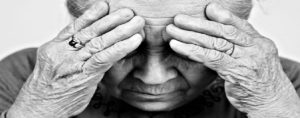Nobody talked about dementia when I was a kid. I didn’t even know what it was until I was in my 40s. And back then it was described as a kind of “brain fog” that affected octogenarians. It wasn’t something I thought about.
It began to get a good deal of attention about 20 years ago, perhaps because older baby boomers – the bulging demographic that has been dominating cultural concerns – were experiencing it.
Even then I wasn’t scared. I was healthy. And anyway, I imagined dementia as simply life without memory. You were basically living “in the here and now.” Wasn’t that supposed to be good?
As time passed, we learned more about it. And it became clear that it was – or could be – crippling, humiliating, and psychologically painful. It was, indeed, scary. Every bit as scary as cancer, and in one way (with the loss of self-awareness) perhaps worse.
So now, like most people my age, I dread dementia. And I have good reason to worry. Because it is becoming increasingly common with people in their 60s and 70s. It’s even popping up in 40-year-olds.
Perhaps because I’m prone to hypochondria, the fear of dementia flashes through my mind almost every day. If I lose my wallet or keys or especially forget why I’ve come into a room, I think, “This is it.”
Recently I heard that stumbling could be an early sign. And sure enough, I’ve been noticing that I do stumble now and then.
“This is weird,” I say to K as we walk through the city.
“Just pick up your feet!” she replies.
“It’s dementia,” I say. “Early onset.”
She laughs. “Not so early,” is her reply.
Perhaps I’ve just developed a lazy, 66-year-old stride. Perhaps. Even so, I’ve spent a few days looking into “early signs” of Alzheimer’s and other forms of dementia. I did the usual Google search and then ran my notes by a few friends and colleagues that do this kind of research for a living. These are smart and knowledgeable people that subscribe to all the well-known medical journals and dozens of alternative health publications. Importantly, unlike most self-proclaimed health experts, they understand the difference between correlation and causality. And that for a study to be scientific, it must be both controlled and double-blind.*
Not surprisingly, they told me that there are lots of wrong ideas about dementia out there in Google Land. These include common ideas about behaviors or symptoms that might “signal” its imminent arrival.
Forgetting your keys, for example, and even walking into a room without knowing why are NOT reliable signs of dementia. Most people do these things. It’s usually the result of mental stress or fatigue or simply distraction.
On the other hand…
Here are 7 early signs that could be significant:
- Frequent falling – tripping over your own feet. (Not the sort of stumbling I’ve been doing, apparently. More like serious falling down.)
- A disregard for legal and social conventions. This could include shoplifting and making inappropriate remarks.
- Missing sarcasm and not being able to tell when people are lying.
- “Reduced gaze” – a tendency to stare at a fixed point in the distance instead of tracking moving objects. Skipping lines when you read.
- Searching for the right word is not a sign… but having difficulty expressing ideas is. It indicates a gradual loss of cognitive function that researchers call “losing knowledge.”
- Eating non-food items or foods that are rotten or spoiled.
- Losing empathy. Usually sweet and polite people become rude and start to say insulting things.
*Double–blind study: One in which neither the participants nor the researchers know which participants are in the treatment group and which are in the control group.
Controlled study: One in which all of the factors are the same except for one variable.

